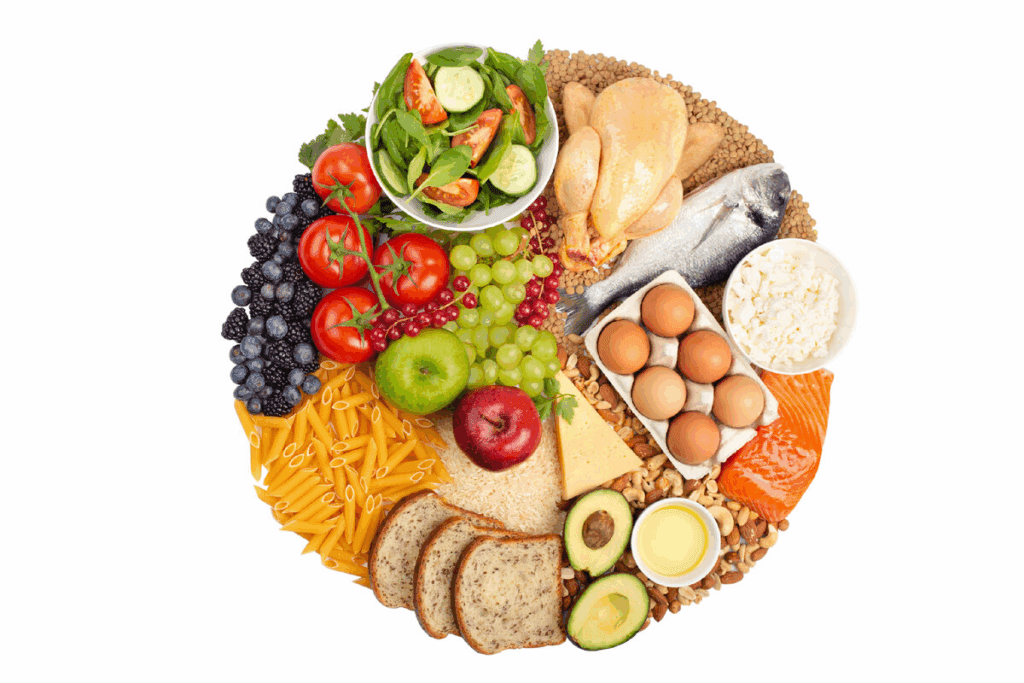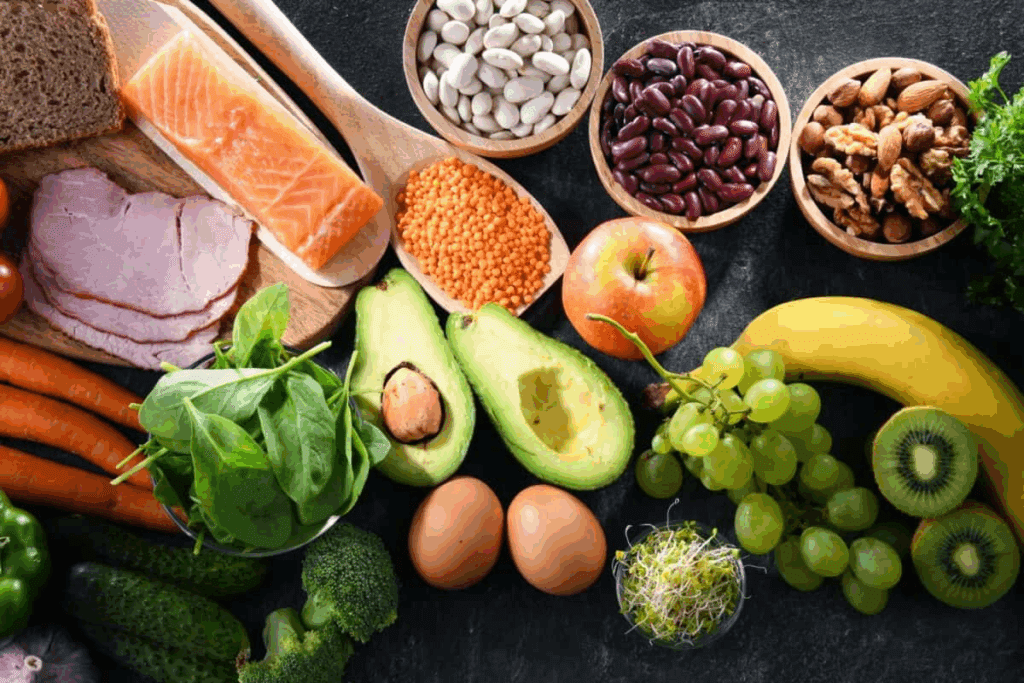Last Updated on November 26, 2025 by Bilal Hasdemir

Five weeks after sleeve gastrectomy surgery, patients start eating solid foods. They move from liquids and purees to a diet rich in protein and low in calories. At Liv Hospital, we focus on a detailed diet plan to help you recover well and lose weight effectively. Get 7 essential tips for your sleeve gastrectomy diet after surgery. This guide outlines your 5-week post-op eating plan.
We use a team approach, combining the latest research and personal support. This helps you follow your diet plan after surgery. A good diet is key to managing severe obesity, as shown in a case report of a young person with juvenile Huntington’s disease who had bariatric surgery.

Patients reach a key point at the 5-week mark after gastric sleeve surgery. This time brings big changes in diet and recovery progress.
The fifth week is a big moment in recovery. Patients move from a liquid diet to soft foods. This step is important for getting back to normal eating.
Key aspects of this transition include:
Switching to soft foods needs careful planning and patience. Start with foods that are easy to digest. Think cooked veggies, soft fruits, and tender meats.
Studies show the value of slow food introduction and portion control after surgery. A good diet helps avoid problems and aids in recovery.
| Food Type | Examples | Tips for Introduction |
| Soft Proteins | Scrambled eggs, soft fish, tender chicken | Start with small portions and chew thoroughly |
| Soft Vegetables | Cooked carrots, green beans, mashed potatoes | Introduce one new vegetable at a time and monitor for tolerance |
| Fruits | Soft fruits like bananas, avocados | Avoid high-fiber fruits initially; opt for ripe fruits |
Understanding the 5-week milestone is key. Carefully moving to soft foods helps patients recover well. Stay hydrated, eat plenty of protein, and follow the doctor’s advice.

A good diet is key for patients to do well after bariatric surgery. Studies show that a planned diet helps keep muscle and aids in lasting weight loss.
The early days of the sleeve gastrectomy diet after surgery are very important. Before surgery, patients follow a special diet to get ready.
After surgery, the diet goes through different stages:
It’s key to eat lots of protein, drink plenty of water, and avoid foods that might cause trouble.
By week 5, patients can start eating more solid foods. This is a big step towards a balanced diet. It’s important for keeping weight off and staying healthy.
| Week | Dietary Stage | Key Foods |
| 1-4 | Liquid to Soft Foods | Protein shakes, pureed vegetables, soft fruits |
| 5-8 | Soft to Solid Foods | Lean proteins, cooked vegetables, soft fruits |
| 9 and beyond | Balanced Eating Plan | Varied proteins, vegetables, fruits, and whole grains |
As patients move through the diet stages, keep focusing on protein, drinking water, and eating mindfully. This helps ensure success.
At the five-week mark after gastric sleeve surgery, it’s key to eat right. You’re moving from pureed foods to soft solids. Focus on meals rich in nutrients to help your health and weight loss.
Protein is essential after surgery. It helps repair tissues, keeps muscles strong, and makes you feel full. Aim for 40-60 grams daily from lean meats, fish, eggs, and dairy.
To hit your protein targets, add protein-rich foods to every meal. Start with scrambled eggs or Greek yogurt for breakfast. Then, include lean meats or fish in your lunch and dinner.
Drinking enough water is vital after surgery. It prevents dehydration, aids digestion, and lowers complication risks. Drink at least 64 ounces a day, focusing on water, low-calorie drinks, and clear broths.
To stay hydrated, carry a refillable water bottle. Set reminders to drink throughout the day.
Mindful eating is key to weight loss and satisfaction after surgery. Listen to your hunger and fullness signals. Eat slowly and enjoy your food to build a healthier eating habit.
Practice mindful eating by eating without distractions. Turn off the TV and put away your phone. Focus on the taste, texture, and smell of your food.
Controlling your portions is critical after surgery. It prevents overeating, lowers complication risks, and aids in weight loss. Use measuring cups or a food scale to measure your portions accurately.
| Food Group | Recommended Daily Intake | Example Foods |
| Protein | 40-60g | Lean meats, fish, eggs, dairy |
| Vegetables | 3-5 servings | Leafy greens, broccoli, bell peppers |
| Fruits | 2-3 servings | Berries, citrus fruits, apples |
| Grains | Limited amounts | Whole grain bread, brown rice, quinoa |
By following these tips, you can aid your recovery, meet your weight loss goals, and develop lasting eating habits after gastric sleeve surgery.
By the fifth week after surgery, you can start eating solid foods again. It’s important to choose foods that are rich in nutrients and easy on your stomach. “A balanced diet is key to successful weight loss and overall health after gastric sleeve surgery.”
Soft Protein Sources to Incorporate
Protein is important for healing and keeping your muscles strong. At 5 weeks, you can add soft protein sources to your diet. Here are some examples:
Vegetables and fruits are important for vitamins, minerals, and fiber. At this stage, choose soft, cooked, or pureed options:
Carbohydrates are important, but eat them in small amounts. Choose soft, easy-to-digest sources:
As you add more foods to your diet, remember to chew your food thoroughly and eat slowly to avoid discomfort. Also, drink plenty of water all day to stay hydrated.
“The key to a successful post-op diet is patience and gradual progression. Rushing into new foods can lead to discomfort or complications,” advises a registered dietitian.
After five weeks of gastric sleeve surgery, a meal plan is key for recovery and weight loss. Now, patients move from pureed to soft foods. It’s important to choose meals that are nutritious and easy to digest.
Eating small, frequent meals helps manage hunger and aids in weight loss. This method, called the 5-6 Small Meals Approach, is good for the stomach and helps absorb nutrients better.
A good meal plan for the fifth week includes soft proteins, veggies, and some carbs. Here’s a daily menu example:
This menu balances protein, healthy fats, and carbs, following the 5-6 Small Meals Approach. Drinking at least 64oz of water a day is also important.
When you eat is as important as what you eat. Eating every 2-3 hours helps keep your energy stable and prevents overeating. It also supports your digestive health.
By following this meal plan and focusing on nutrient-rich foods, patients can confidently move through the fifth week after gastric sleeve surgery. This sets the stage for long-term success.
At 5 weeks after gastric sleeve surgery, it’s key to watch what you eat. Your stomach is healing, and some foods can be hard on it. We’ll show you which foods to avoid during this important time.
High-fat and fried foods are hard to digest. They can make you feel sick or even cause serious problems. Stay away from foods like French fries and fried chicken. Choose lean proteins and low-fat cooking instead.
Sugary foods and drinks can cause dumping syndrome. This is when food moves too fast from your stomach to your small intestine. Avoid sugary drinks and sweets. Instead, pick fruits for natural sweetness and watch your portion sizes.
At this time, tough meats and fibrous veggies are hard to digest. Don’t eat tough meats or raw veggies like broccoli. Go for tender, cooked veggies and soft proteins.
Drinks with carbonation can make you feel gassy. Alcohol can also upset your stomach and slow down your recovery. Stay away from soda, sparkling water, and alcohol. Drink water, clear broths, or electrolyte-rich drinks instead.
Avoiding these foods and eating a balanced diet helps your recovery. Your diet is key to your health and weight loss journey after gastric sleeve surgery.
Eating after gastric sleeve surgery needs careful thought and specific methods. These habits help in recovery and prevent complications. They are key to a successful outcome.
Mastering the 20-30 minute meal rule is essential after sleeve gastrectomy. It means eating slowly and taking 20-30 minutes for a meal. This helps recognize when you’re full, avoiding overeating and discomfort.
To follow this rule well, try:
Thorough chewing is vital after gastric sleeve surgery. It breaks down food into smaller pieces, making it easier to swallow and digest. This prevents food blockages and discomfort.
To chew food well:
Drinking liquids with meals can cause issues. It leads to poor chewing and discomfort. It’s best to separate eating and drinking.
To keep drinking and eating separate:
By following these eating techniques, you can reduce the risk of complications. This ensures a smoother recovery after sleeve gastrectomy surgery.
| Eating Technique | Benefit | Implementation Tip |
| The 20-30 Minute Meal Rule | Reduces the risk of overeating and discomfort | Use a timer to pace your meal |
| Thorough Chewing Methods | Prevents food blockages and discomfort | Chew each bite at least 20-30 times |
| Separating Eating and Drinking | Ensures adequate chewing and prevents complications | Avoid drinking liquids during meals |
Keeping an eye on what you eat is key after gastric sleeve surgery. It’s important to track your progress to make changes and reach your weight loss goals.
Food journaling is a great way to monitor your nutrition. By writing down what you eat and drink, you can spot patterns and make better diet choices. Use a food diary or a mobile app to make it easier.
Make sure to note portion sizes, meal times, and how you feel after eating. This info helps you and your healthcare team spot any diet problems and make changes.
It’s also important to track your weight loss. Regular weigh-ins keep you motivated and help spot any issues early. We suggest weighing yourself once a week at the same time.
Watch for other signs of progress, too, like how your clothes fit and your energy levels. These signs give a fuller picture of your health and help you adjust your diet as needed.
After surgery, you might be at risk for nutritional deficiencies. Regular blood tests and check-ups with your doctor can catch these early.
Look out for deficiencies in vitamin B12, iron, and calcium. Knowing these risks and checking your nutrient levels helps prevent or fix any problems.
By using food journals, tracking weight, and checking for nutritional deficiencies, you can manage your health after gastric sleeve surgery. This approach helps you stay healthy and balanced for years.
At the 5-week mark after a sleeve gastrectomy, patients face new hurdles. Their body are adjusting to eating differently and absorbing nutrients. This can cause various problems.
One big challenge is becoming intolerant to certain foods. The stomach changes after surgery, making it hard to digest some foods. Common issues include dairy, certain meats, and high-fiber veggies.
To tackle food intolerances, keeping a food diary is key. It helps track reactions and guide diet changes.
Hunger and cravings can be tough to handle. It’s important to tell true hunger from cravings caused by emotions.
Drinking water and eating protein can help control hunger. Mindful eating, like eating slowly, also helps avoid overeating.
Weight loss plateaus or slow progress are common at 5 weeks. Reasons include not enough protein, not drinking enough water, or not following the diet.
To beat plateaus, review and tweak your diet. Regular check-ins with a healthcare provider or dietitian are also helpful.
Dealing with social eating after surgery can be hard. It’s important to balance social life with dietary needs, which can feel isolating.
Plan for social events by bringing food or eating beforehand. Talking about your diet with friends and family can also help.
| Challenge | Strategies |
| Food Intolerances | Keep a food diary, avoid trigger foods, and consider supplements |
| Hunger and Cravings | Stay hydrated, prioritize protein, practice mindful eating |
| Weight Loss Plateaus | Review and adjust eating plan, consult healthcare provider |
| Social Eating | Plan, bring suitable food, and communicate dietary needs |
Understanding and tackling these challenges can make the post-op journey easier. It sets patients up for success in the long run.
After sleeve gastrectomy surgery, it’s key to work with your healthcare team. They help you recover well and succeed long-term. They support you from the start to making lasting lifestyle changes.
Knowing when to call your surgeon is important. Call them right away for severe symptoms like intense pain, vomiting blood, or dehydration.
Talking to your surgeon often helps solve problems early. This keeps your recovery on track.
| Symptom | Action |
| Severe abdominal pain | Contact the surgeon immediately |
| Mild nausea or discomfort | Monitor and consult during the next scheduled appointment |
Seeing a dietitian is key after surgery. They create a meal plan that fits your needs. This ensures you get enough protein and stay hydrated.
Regular dietitian visits help you:
Sleeve gastrectomy changes you physically and emotionally. Getting psychological support is vital for coping.
We suggest using:
Working with your healthcare team helps you face post-operative challenges. This way, you can achieve lasting success with your gastric sleeve surgery.
Reaching the 5-week mark after sleeve gastrectomy surgery is a big deal. It’s time to focus on building habits that last. A good sleeve gastrectomy diet plan is key to keeping weight off and staying healthy.
Studies show that lasting lifestyle changes are key to success after bariatric surgery. Eating a balanced diet after sleeve gastrectomy helps ensure you get all the nutrients you need.
To keep living healthy, remember to eat enough protein, drink plenty of water, and eat mindfully. Also, don’t forget to see your healthcare team regularly. They can help track your progress and solve any problems.
By sticking to these habits and following a gastric sleeve diet after surgery that fits you, you can enjoy long-term success. And, you’ll see a big improvement in your quality.
At 5 weeks post-op, start with soft, nutrient-rich foods. This includes soft proteins, veggies, fruits, and carbs.
Aim for 40-60g of protein daily. This supports your health and weight loss goals.
Avoid high-fat and fried foods, sugary items, tough meats, and fibrous veggies. Also, steer clear of carbonated drinks and alcohol.
Eat 5-6 small meals a day. This helps manage food intake and supports your health and weight loss.
Hydration is key, aiming for at least 64oz daily. It supports your health and prevents dehydration.
Use food journals, monitor weight loss, and check for nutritional deficiencies. This helps track your progress and make needed changes.
If you notice new food intolerances, talk to your healthcare team. They can help identify the cause and manage symptoms.
Use mindful eating, practice strict portion control, and stay hydrated. These methods help manage hunger and cravings.
Contact your surgeon for severe pain, vomiting, or swallowing issues. They can provide guidance and support.
Regular dietitian consultations offer personalized guidance. They help you reach your weight loss goals and maintain a healthy lifestyle.
We provide psychological support to help with the emotional aspects of weight loss. This supports a healthy lifestyle.
Adopt healthy eating habits, stay hydrated, and keep up with regular care. These habits support long-term success.
Bettini, S., Sibilio, G., Campana, R., & Zamboni, M. (2020). Diet approach before and after bariatric surgery. Nutrients, 12(2), 321. https://pmc.ncbi.nlm.nih.gov/articles/PMC7455579
Subscribe to our e-newsletter to stay informed about the latest innovations in the world of health and exclusive offers!